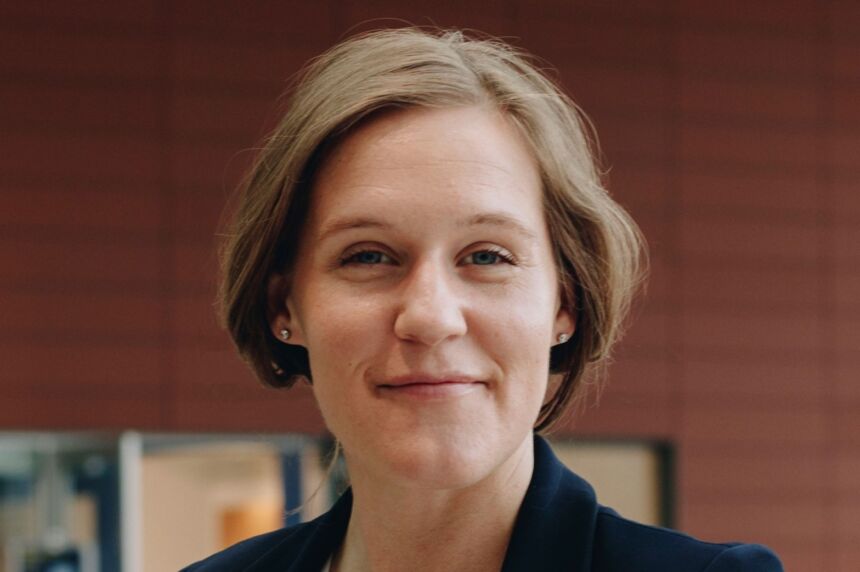April 20, 2022
Visual artistry, collaboration inspires Lindsey Landfried’s role as development advocate

The associate director for arts advancement has a history of collaboration with the Center for the Performing Arts.
By Heather Longley The overlap between the visual and performing arts is apparent in many ways, so to make a career transition rooted in one medium to the other wasn’t a hard sell for Lindsey Landfried. April marks Landfried’s fourth month as the associate director of arts advancement at the Center for the Performing Arts at Penn State, but she came to the job with an appreciation. She has collaborated with the center in the past as both an artist and an administrator, working with former center Director George Trudeau and staff to bridge the creative camps. In 2016, works from her acrylic-on-paper hand-looped series were displayed in the conference room of Eisenhower Auditorium. In 2018, she assisted with the commission of “Extended Sunset,” an illuminated window display by artist Adam Frehlin. In her previous role as curator and senior gallery manager at HUB-Robeson Galleries, she partnered with the center’s engagement team to develop events that included students in arts- and community-based discussion. “I have appreciated the unique and important role that the center has in our arts ecosystem for many years,” Landfried said. Inherent in the process of both creating and presenting artforms is to advocate for them. Landfried said she looks forward to using her own arts experiences to assist the center and community.I am excited to be part of this team as we prepare to celebrate the 50th anniversary of Eisenhower in 2024, rebuild following COVID-related closures, and realize new opportunities and strengths visioned by our director, Sita Frederick.” — Lindsey LandfriedIn a recent email exchange, Landfried answered questions about her role for the center and how practicing art informed her desire to advocate on behalf of artists of all fashions. Q: What are your goals as associate director of arts advancement? A: My goals are to grow our supporters’ impact, assist in the ongoing recovery efforts resulting from the pandemic, amplify the center’s work, and to steward the crucial and precious relationships we have with our supporters on campus and in central Pennsylvania. Q: How has the personal practice of visual art assisted or informed your role in performing arts development? A: As an artist, I have two distinct ways of working. One part is as an abstract painter, where I process and communicate about phenomena I observe, often alone and in an interior reflexive way. The second part is as a socially engaged practitioner, where I work collaboratively to realize powerful arts experiences together with groups of people organized as institutions. Part one has taught me a lot about how to look around and listen with care, which supports building relationships. Part two has taught me about how to be effective and actionable for the scale of impact that takes many people to realize. Q: How is arts advocacy in performing arts different than in the visual arts? A: At their core, I believe there are more similarities than differences, though often the performing arts can reach more people in a given moment and more immediately than the visual arts. The arts – both visual and performing – make a huge impact; they create and question culture, foster freedom of expression, catalyze transformative social change, connect and deepen our connections as community, and hold space for learning and growing. In the United States, philanthropy is a critical leader in our arts economy. By funding art, philanthropy funds our ongoing ability to define and shape our world. Q: What would you like the community to know about you in this role? What is something about you outside of this role that you’d like to share? A: Please do not hesitate to contact me for a walk, a coffee or a phone call. Your perspectives, input, experiences and points of view are important for informing my role, and, more importantly, the work of the Center for the Performing Arts. Outside of this role, you’re likely to find me supporting any and possibly all of the arts organizations in our community, biking and gardening with my family. Email Landfried at lll166@psu.edu. Heather Longley is a communications specialist at the Center for the Performing Arts.
